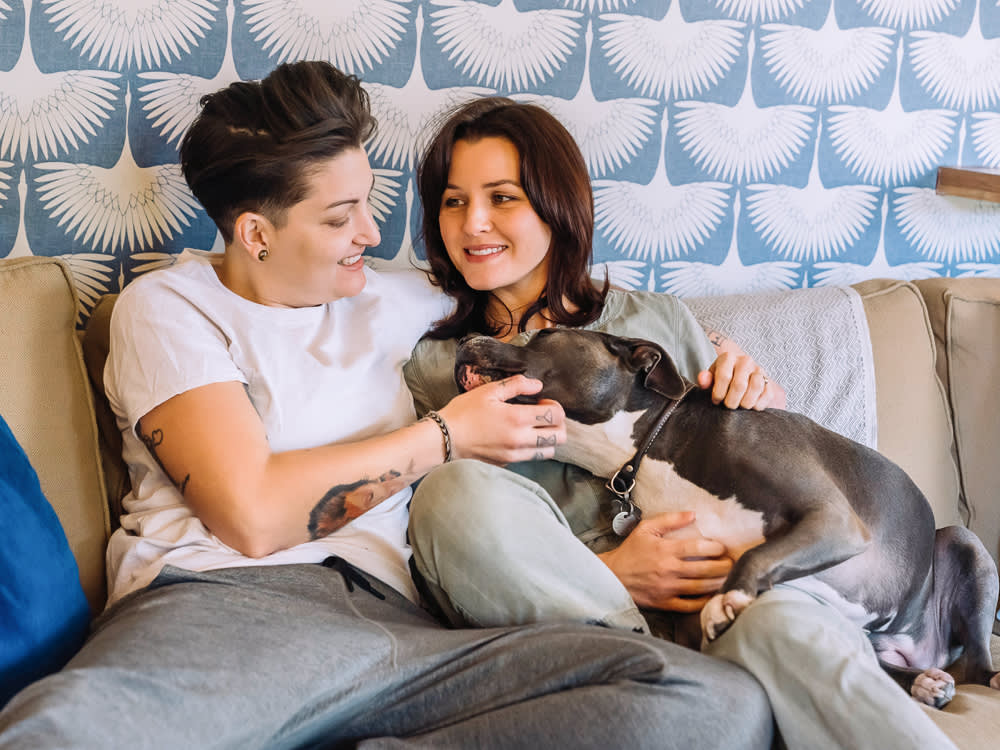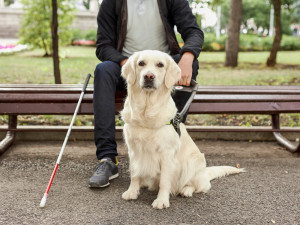Guess Which Shelter Dogs Make Great Service Dogs
Loyal, devoted, and dutiful, Pit Bulls are proving to be pretty well suited to helping humans in need.

Share Article
When you hear the words “service dog,” what kind of pup comes to mind? Typically, it will be a Golden or Labrador Retriever — breeds who have, over the years, become synonymous with this role. Programs are devoted to breeding, training, and placing these dogs with humans who need them. It’s noble work for sure.
A New York-based 501(c)(3) nonprofit, Animal Farm Foundationopens in new tab, takes that noble work even further by training service dogs who buck the breed stereotype — all are shelter dogs, and most are Pit Bulls [American Pit Bull Terriers or American Staffordshire Terrier mixes]. Pit Bulls make up the overwhelming majority in many animal shelters, so this is a great way to give them a loving home and a purpose.
Not only do their big Bully smiles lift hearts, but they also reflect the dogs’ natural comfort with their jobs, which include serving hearing-alert, mobility, and psychiatric services. In training these dogs to provide specialized and individualized support, and matching them with people who need them at no cost to the recipient, AFF helps create positive changes for a breed of dog all too commonly affected by negative stereotypes and discrimination.
Pit Bull Service Dog Candidates
AFF trainers visit shelters, looking for canine candidates who are confident, good with other animals, noise-tolerant, and comfortable with being handled. Once dogs have been transferred to the AFF shelter in New York, more time is spent evaluating their suitability as service dogs. Regardless of whether a dog finally ends up doing this work, every dog AFF takes in is provided for, often through adoption as a family pet.

Inmates at the Rikers Correctional Facility do some of the initial training through the AFF-sponsored program, Paws of Purposeopens in new tab. For two months, dogs live with program participants in the correctional facility’s housing area, where they receive 24/7 attention from the men to whom they’re assigned. The men take classes on dog care, and a certified professional dog trainer works with them to provide the dogs with companionship, basic obedience training, and socialization.
The support goes both ways: In interacting with the dogs and being the beneficiaries of unconditional and uncritical canine attention, the men learn more about themselves. According to the NYC Department of Correction, the program reduces institutional violence and helps inmates build social skills that will, ideally, smooth their transition back into society.
Dogs judged to be suitable for service work receive further training, learning to do a number of different jobs specific to what an individual handler may need. These may include alerting people to sounds, retrieving dropped objects, opening and closing doors and cabinets, guiding wheelchairs, or responding to panic attacks. AFF trains both the dogs and their handlers, and also provides additional training as handlers’ needs evolve.
Removing Breed Labels
The belief that all dogs are individualsopens in new tab underlies AFF’s approach. It mandates that dogs be judged on their actual behavior rather than on their looks, assumptions, or stereotypes, a concept that’s also extended to people. As noted on the AFF website, “People shouldn’t be judged by their disabilities, living situations, income, age, race, gender, sexuality or by their past — and none of those things should be used as excuses to keep dogs and people apart.”
Susan Tasaki
Freelance writer Susan Tasaki lives in the San Francisco Bay Area with her Husky, who wishes they both got out more.

